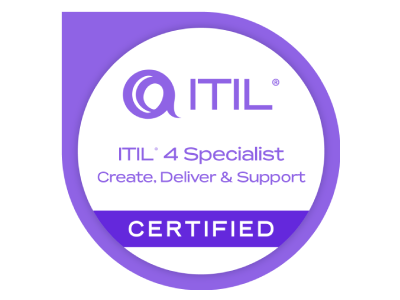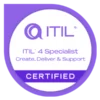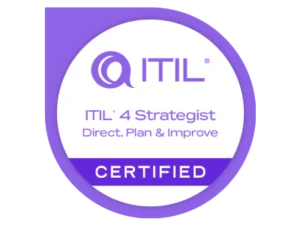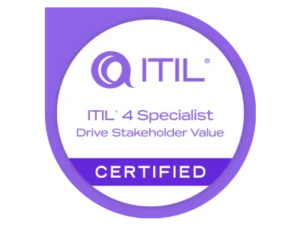ITIL® 4 Specialist: Create, Deliver and Support
Become an ITIL® 4 CDS Specialist and learn how to develop, deploy, and maintain IT-enabled products and services. Understanding service performance, service quality, and improvement—as well as pertinent techniques and tools—will be made easier with this ITIL 4 specialist training.
Overview
ITIL® 4 is the latest update of the world’s most popular framework for IT Service Management, offering a renewed focus on value-driven practices and the optimisation of IT services. ITIL® is a widely used IT Service Management framework to give organisations direction for using IT tools and making improvements in the business process. The primary objective of ITIL® is to improve efficiency, achieve predictable service levels, and enhance the performance of the organisation.
What Skills Covered in ITIL® 4 Specialist: Create, Deliver and Support Course?
- Service design
- Release management
- Service desk
- Service level management
- Deployment management
- Ensuring stakeholder satisfaction
- Knowledge management
- Software management
- Change enablement
- Problem management
- Software development
- Service validation and testing
- Incident management
- Monitoring and event management
Who should take up this ITIL® 4 Specialist: Create, Deliver and Support Course?
- IT Service Managers
- IT Directors
- IT Consultants
- IT Audit Managers
- IT Project Managers
- Operations Managers
- Quality Analysts
- Process Owners
- Service Desk Managers
- DevOps Team Members
- IT Architects
- Software Developers
- IT Support Staff
- Data Analysts
- Business Managers responsible for IT services
- Professionals aiming to learn about advanced ITIL practices
- Individuals seeking ITIL Managing Professional (MP) status
- Anyone involved in the design, delivery, and support of IT-enabled services
Our Package
1.01 ITIL 4 Specialist
2.01 Service Value System to Create Deliver and Support Services
2.02 Organizational Structure
2.03 Differences in Organizational Structure
2.04 Roles and Competencies
2.05 Professional IT and service management skills and competencies
2.06 Professional ITSM Skills and Competencies Examples
2.07 Generalist or T-Shaped Models
2.08 Developing a broad set of competencies
2.09 Workforce Planning and Management
2.10 Employee Satisfaction Management
2.11 Results-Based Measuring and Reporting
2.12 Performance Measures
2.13 Team Culture and Differences
2.14 Importance of Cultural Fit
2.15 Team Collaboration and Integration
2.16 Guidelines for a Positive Team Culture
2.17 Continual Improvement Culture
2.18 Collaborative Culture
2.19 Algorithmic and Heuristic Tasks
2.20 Servant Leadership
2.21 Customer-Oriented Mindset
2.22 Customer Orientation
2.23 Customer-Oriented Strategy
2.24 The Value of Positive Communication
2.25 Principles of Communication
2.26 Integration and Data Sharing
2.27 Integration Approaches
2.28 Reporting and Advanced Analytics
2.29 Big Data
2.30 Collaboration and Workflow
2.31 Robotic Process Automation (RPA)
2.32 RPA Technologies
2.33 Artificial Intelligence AI
2.34 Machine Learning
2.35 CI/CD
2.36 Goals and Value Measurement
2.37 Aligning CI/CD with ITIL
2.38 The Value of an Effective Information Model
2.39 Automation of Service Management
2.40 Key Takeaways
Knowledge Check
3.01 Value Streams to Create, Deliver, and Support Services
3.02 ITIL Service Value Streams
3.03 Value Streams and Organizations
3.04 Value Stream Considerations – Part One
3.05 Value Stream Considerations – Part Two
3.06 Value Stream Considerations – Part Three
3.07 Designing a Service Value Stream
3.08 Describing a Step of the Value Stream
3.09 Value Stream Mapping
3.10 Key Metrics for Analyzing a Value Stream
3.11 Designing a Value Stream Using Little’s Law
3.12 Value Stream Models
3.13 Development of a New Service
3.14 Six Key Steps of Journey from Demand
3.15 Acknowledge and Document the Service Requirements
3.16 Decide Whether to Invest in the New Service
3.17 Design and Architect the New Service to Meet Customer Requirements
3.18 Obtain or Build within the Service Value Chain
3.19 Deploy Service Components in Preparation for Launch
3.20 Release New Service to Customers and Users
3.21 Upgrade and Restore a Live Service
3.22 Seven Key Steps of Journey from Demand to Value
3.23 Acknowledge and Register the User Query
3.24 Investigate the Query
3.25 Obtain a Fix from the Specialist Team
3.26 Deploy the Fix
3.27 Verify That the Incident Has Been Resolved
3.28 Request Feedback from the User
3.29 Identify Opportunities to Improve the Overall System
3.30 Using Value Streams to Define a Minimum Viable Practice
3.31 Key Takeaways
Knowledge Check
4.01 Create Deliver and Support Services
4.02 Managing Queues
4.03 Prioritization
4.04 How to Prioritize Work
4.05 Techniques to Prioritize Work – Part One
4.06 Techniques to Prioritize Work – Part Two
4.07 Swarming
4.08 Challenges of Swarming
4.09 Shift-Left Approach
4.10 Build vs. Buy Considerations
4.11 Defining Requirements for Service Components
4.12 Selecting a Suitable Vendor
4.13 Sourcing Models and Options
4.14 Types of Sourcing Models
4.15 Service Integration and Management
4.16 Service Integration and Management Considerations
4.17 Key Takeaways
Knowledge Check
Upcoming Batch
April 20th (Weekends)
FRI & SAT (4 Weeks)
08:30 PM to 01:00 AM (CDT)
April 18th (Weekdays)
MON – FRI (18 Days)
10:00 AM to 12:00 PM (CDT)
ITIL® 4 Specialist: Create, Deliver and Support FAQs
This ITIL® 4 course covers service management practices, service creation/delivery, value stream design, workflow integration, automation, and managing teams. It enhances learners’ delivery/support capabilities for effective IT services.
After ITIL® 4 Specialist: CDS, prospects include roles like IT Service Manager or Operations Manager, in sectors like tech, finance, healthcare, with potential for career advancement to senior IT management.
The duration of the course 24 hours.
A laptop, decent internet speed, a Headset with microphone is required.
To be eligible to take this ITIL Specialist training, applicants should have:
- Passed the ITIL 4 Foundation examination
- Attended an accredited training course for this module








Reviews
There are no reviews yet.